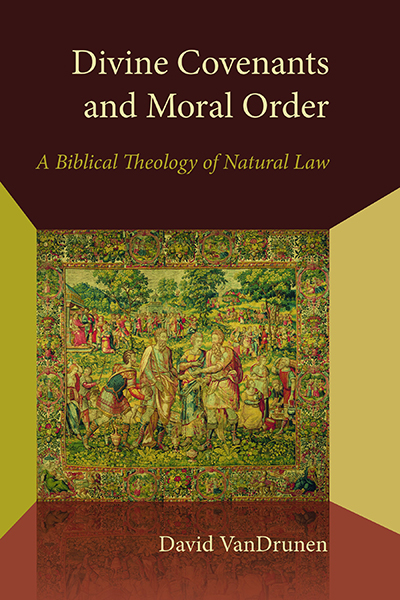
David VanDrunen
Reviewed by: Brenton Ferry
Divine Covenants and Moral Order: A Biblical Theology of Natural Law, by David VanDrunen. Published by Eerdmans, 2014. Paperback, 582 pages, list price $45.00. Reviewed by OP pastor Brenton Ferry.
In 2002, T. David Gordon wrote "How My Mind Has Changed: The Insufficiency of Scripture" in Modern Reformation (online). He argued that an exaggerated view of the sufficiency of Scripture kept evangelicals from seeing that wisdom derives from natural law as well as Scripture. VanDrunen does not refer to this obscure article, but he and Gordon could be read together. If Gordon presented a problem, VanDrunen develops a solution: "Perhaps the key human attribute necessary for understanding the natural law … and putting it into practice is wisdom" (p. 15).
The book is exegetical, biblical theology. The author's purpose is to write about natural law from a "specifically Reformed" foundation (p. 9). "The natural," he writes, "is a covenantal reality" (p. 13). He defines natural law as "the obligation and consequences incumbent upon and known by human beings as image-bearers of God and participants in the protological [original] moral order" (p. 15). All people know natural law's moral obligations apart from special revelation "in some way and to some degree" (p. 18), even apart from "a set of discrete rules" (p. 486).
The book is in two parts. Part one looks at natural law in relation to the covenant of creation. Part two considers natural law in relation to the covenant of grace.
In the covenant of creation, natural law is a consequence of the divine image (ch. 1). In the Noahic covenant of common grace, natural law is "at least a basic, minimal ethic designed for the preservation of the social order" (p. 19) in light of the fall, focusing on procreation, food, and justice (ch. 2). The folly of Sodom, the wisdom of Abimelech (ch. 3), the prophetic oracles about the nations (ch. 4), and Romans 1–2 (ch. 5) exemplify the common grace ethic of the Noahic covenant.
In the covenant of grace, Abraham was subject to natural law as a sojourner (ch. 6). The Mosaic covenant "reflected both the substance and the sanctions of the natural law" (p. 21) in a qualified way (ch. 7). Wisdom literature demonstrates that natural law is not unique to those in the covenant of grace (ch. 8). "Under the new covenant Christians have been released from the protological natural law at an ultimate level.… Yet at a penultimate level they must continue to live within the structures of this present world, and thus under the authority of … natural law" (p. 22, ch. 9).
The author concludes by noting the limitation of his work. "What I have attempted here is not an all-comprehensive natural law theory, but a biblical framework for Christian thinking about natural law that leaves room for … further philosophical, biological, and sociological investigation of the subject" (p. 480).
June 15, 2025
June 08, 2025
June 01, 2025
Anxiety: Finding the Better Story
May 25, 2025
April 27, 2025
The Devoted Mind: Seeking God’s Face in a World of Distraction
April 20, 2025
April 13, 2025
© 2025 The Orthodox Presbyterian Church